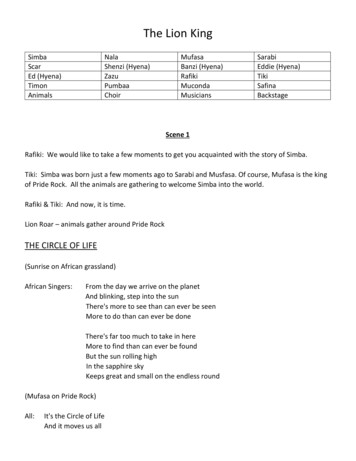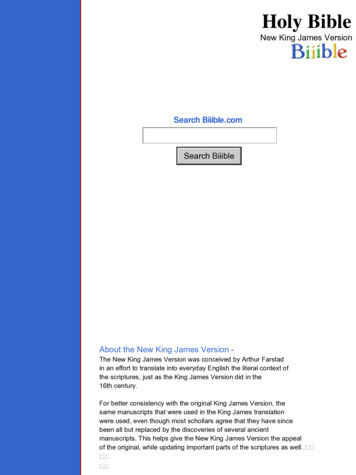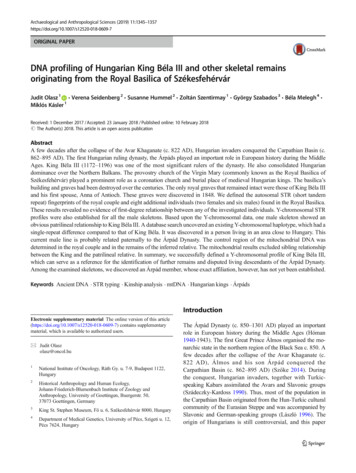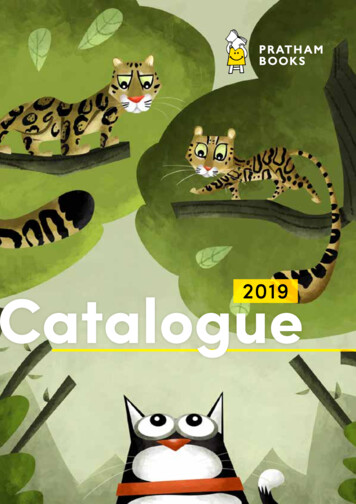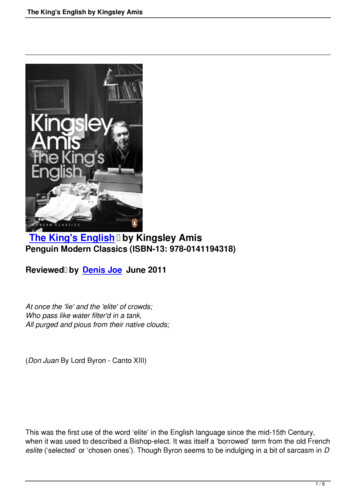
Transcription
The King's English by Kingsley AmisThe King's English by Kingsley AmisPenguin Modern Classics (ISBN-13: 978-0141194318)Reviewed by Denis Joe June 2011At once the 'lie' and the 'elite' of crowds;Who pass like water filter'd in a tank,All purged and pious from their native clouds;(Don Juan By Lord Byron - Canto XIII)This was the first use of the word ‘elite’ in the English language since the mid-15th Century,when it was used to described a Bishop-elect. It was itself a ‘borrowed’ term from the old Frencheslite (‘selected’ or ‘chosen ones’). Though Byron seems to be indulging in a bit of sarcasm in D1/6
The King's English by Kingsley Amison Juan, the term fell into common usage and generally came to describe a group of people who setthemselves apart from society through their tastes in the ‘finer things in life’. The term wassometimes used interchangeably with ‘snobs’, but there is a vast difference between thepretentions of snobbery and the rigorous defence of values that was a characteristic of elitism.I say ‘was’ because although there is an Elite with us today, it bears no similarity to the informedand practiced Elite of which Kingsley Amis was an exemplar. Whilst the older Elite sawthemselves as guardians of culture, who would make the occasional demand on the ArtsCouncil to cough up the cash to cover the overspend in productions of Wagner at the RoyalOpera House and would demand the expulsion of anyone who dare to present themselves, atthe high temple, in denims, they did hold to a system of values, even if those values were fortheir exclusive appreciation.By contrast, today’s elite are philistines, but instead of keeping their ignorance to themselvesthey see their aim as an egalitarian crusade to spread the word of their Gospel. Their contemptfor the old guard matches their horror of ‘chavs’ from areas such as Wythenshawe inManchester or Norris Green in Liverpool.Both ‘toffs’ and ‘chavs’ are seen to represent an ‘Old England’ that the smart set would prefer toforget about. Whilst having no compunction about giving voice to their naked hatred for whiteworking class youth (usually male), in the same breath they mock the ‘toffs’ and all that isassociated with the old school tie brigade. As Brendan O’Neill says: “In reality, it is a highlyindividuated campaign rather than a political battle, motivated more by the politics of envy andresentment for the rich than by anything resembling a principled position . . .” (see BrendanO’Neill The culture war on toffs and chavs ). As such they offer little alternative to the culturaltraditions of the old Elite, beyond some vague relativist concept of respect for other ‘cultures’and that the rest of us adhere to their version of niceness.2/6
The King's English by Kingsley AmisAmis had nothing but contempt for the upper class who spoke pedantically; careful to enunciateeach spoken word. He referred to them as wankers. However it was the lower orders that hesaw as the real enemy, though he was rather reserved in labelling them ‘berks’:Berks are careless, coarse, crass, gross and of what anybody would agree is a lowersocial class than one's own. They speak in a slipshod way with dropped Hs, intrudedglottal stops, and many mistakes in grammar. Left to them the English language woulddie of impurity, like late Latin.(Quoted by Martin Amis. Guardian, 27 May 2011)As such, Amis indicated the class nature of language, which can be traced back to the Normanconquest when many French words entered the language. For instance the Norman nobilitycreated a system in Briton of separating the terms for animals and their meat. The animal nameis English ("cow", "sheep", "pig") while the names of the meats derived from these animals isFrench ("beef", "mutton", "pork"). This suggested the gap between the noble dinner and thecommoners mete (a term which referred to food in general) that they slaughtered.3/6
The King's English by Kingsley AmisIn many ways The King’s English acts more as a companion to H.W. Fowler’s A Dictionary ofModern English Usage (published in 1922), which was re-issued by Oxford World’s Classics in 2009 (and is the only readable referencebook that I know of). The point is that both books have a certain quaintness to them as theirsubject is hardly taken seriously these days. Each book represents a middle-class trend ofprofessionalisation - asserting itself as a unique strata from the businessmen and shopkeepers– who were increasingly playing the role of state functionaries in institutions and the evolution ofmodern local government from the 1830s onward. This trend coincided with the growth ofinterest in languages (see David Crystal’s introduction to H.W. Fowler.op. citedp.viii - ix); their history and regional varieties, which saw a growth in vernacular literature, fromwriters such as Charles Dickens and Thomas Hardy, that continued up to the outbreak of WorldWar 2.Whereas Fowler’s book was a response to an inquisitive and confident middle class, Amis’s TheKings Englishcan be seen as a last gasp attempt to save the English language from ‘barbarism’. What isstriking about Amis’s book is how subjective it is. It would be easy to simply dismiss it as theramblings of some old reactionary. It is certainly not rigid in its analysis of words, terms,prefixes, suffixes, idioms and pronunciation, but it is the outcome of a learned and passionatemind.The entries are in chronological order and, for the most part, are the result of Amis’s frustration.Some might prefer ‘intolerance’ and that does seem to be the case when Amis is discussing‘Americanisms’. He opens the section by declaring his pro-American ideals and pointing to thefact that as far back as 1789 Benjamin Franklin sent the lexicographer “. . . Noah Webster a listof unauthorised words that should carry a ‘discountenancing mark’ in his eventual AmericanDictionary of the English Language(1828)” [p.26].AmericanEnglish evolved from the various dialects of the early settlers but took on a greater (political)importance with the War of Independence. With the rise of America as a world power particularly in the post-WW2 period – Americanisms came to replace many aspects of Anglicismand Amis bemoans this, citing the Fowler brothers, who in their book4/6
The King's English by Kingsley AmisThe King’s English(1906), made clear that “The English and the American language and literature are both goodthings; but they are better apart than mixed.”The section on the use of ‘And’ is one of the most hilarious, yet informative, parts of Amis’sbook; suggesting how easy it is to make a blunder as well as creating a great deal of confusion.Having pointed out the misuse of a comma in a sentence that is also a list (peas, carrots andbroccoli); noting the tendency to put a comma after the penultimate word and before ‘and’, hethen goes on to point out that ‘and’ can be used more than once in a sentence as well as statingthe legitimacy of using ’And’ to begin a sentence.Amis never shies away from his prejudices and the subject of this book allows him plenty ofscope to indulge them whilst wittily avoiding causing offence. Take the section on the word‘execute’ where he states that the term was generally thought to describe judicial decapitation.And those who held to this definition he refers to as the ‘half-educated’ [p. 64].The most interesting parts of The King’s English are those that deal with socially orpolitically-loaded words and uses. Having stated that he looked forward to the total equality ofmen and women, if only because it would bring about the end of feminism, he points to theproblem with writing ‘he’ or ‘she’ and seems to agonise about is because, as he states; “ . . Iwould rather be safe than sorry, and to find myself the occasion of some feminist outburst aboutunconscious (or conscious) chauvinism . . . “ [. 68]. Originally published, posthumously, in 1998,it is incredible to think that, though meant in jest, this statement speaks loudly to us in thesemore delicate times where offence is taken as a result of the most innocent of things (e.g.: seeCadbury’s insult Naomi Campbell and Black women).5/6
The King's English by Kingsley ofonasto6/6
The King's English by Kingsley Amis In the section on Political Word, Amis reminds us of how the word 'refute' had, in the mouths ofpoliticians, morphed from its original meaning of proving the falsity of an argument or statementto simply becoming an expression of denial. It is what George Orwell, in his essay the English Languagerefers to .


